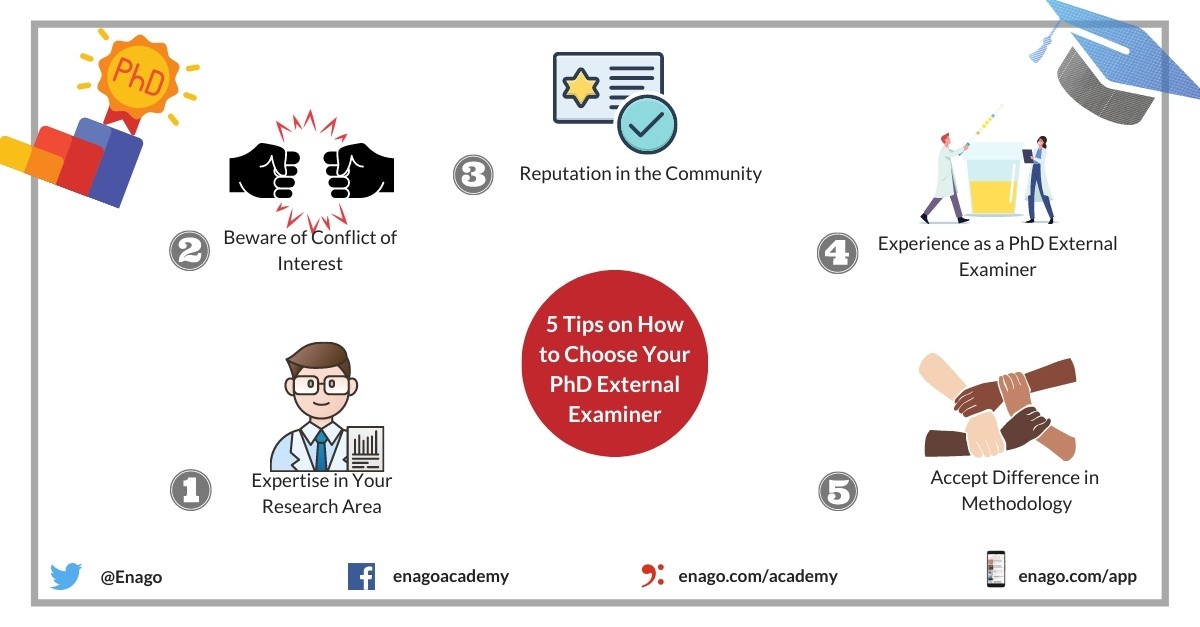Top 5 Tips on How to Choose Your PhD External Examiner

In your PhD journey, you may have seen it all—late nights, tears, frustration! Although completing your PhD thesis is an accomplishment in itself, defending it is a momentous event. When preparing to defend their thesis becomes a priority, PhD students often neglect the importance of choosing the right external examiner. In this article, we shall discuss why it is important to choose your PhD external examiner wisely and also share the top 5 tips on how to do so.
Why is Choosing the Right PhD External Examiner Important?
If we are to be inspired by Socrates, we could unhesitatingly say “an unexamined thesis is not worth writing”. Therefore, considering that thesis examination is an object of study, the selection of your examiner must be done scrupulously. Hence, what stands between you and the hallowed status of “Doctor” is the thesis defense. A PhD student cannot directly select an external examiner. However, you can suggest examiners to the academic unit. As you have been involved in the study for years, you know the intricacies of the research and who would be suitable for judging the same. You can do all you want to defend your thesis in the best possible way but it would stay fruitless if you do so in front of the wrong examiners.
What Happens When You Do Not Choose the Right Examiner?
As part of the PhD examination process, examiners take anywhere between two to four weeks to read your submitted thesis and accept it for defense. The countless hours you’ve put into conducting research and completing your thesis cannot be undermined by a poor choice of external examiners.
A PhD thesis defense can be a disaster if your examiners do not grasp the intent of your thesis and the scholarly context of work. Your decision of choosing a wrong examiner may have unpredictable outcomes. It could mean a tense discussion between you and the examiner. Furthermore, it may also result in months spent on rewriting your thesis to the understanding of your examiner. It is not about finding an examiner who can easily handover your PhD degree without proper judgment. Rather, it is important to find examiners who have the expertise in your research area and can provide well-informed judgments.
Tips to Consider While Selecting Your Examiner

The process of selecting an external examiner is not as difficult as it may seem. It’s likely you have already known your examiner during your literature review.
Here we discuss the top 5 things to consider while selecting your PhD external examiner.
1. Expertise in Your Research Area
Only researchers involved in similar topics can be considered as experts to judge your work. Therefore, you must begin with making a list of academic authors within your research domain and find them on different social networking platforms such as LinkedIn, ResearchGate, Academia.edu, Altmetric, Google Scholar, Mendeley, etc. Use this information to make a short document for your supervisor’s and department’s consideration. Include your rationale for why they would be a good PhD external examiner. It’s better to submit the examiner profile document to your supervisor at least six months before you plan to submit your thesis.
In an exceptional situation, finding a conversant examiner may get difficult if your research aims to cover multiple topics. In such case, choose examiners striking a balance, with the aim to cover at least a couple of the most important areas that you refer to in your thesis.
2. Beware of Conflict of Interest
Conflict of interest guidelines are set to protect candidates, examiners, and the university from potential negative perceptions during the PhD thesis examination. Even if the external examiner has no conflict of interest with you, they may have one with the institution or the supervisor. As a researcher, you may have made connections with several people from your field. Existence of a conflict of interest does not directly prevent a potential examiner from being approved as a thesis examiner. You may make your supervisor aware of such connections and networks—it’s up to them to decide if the relationship constitutes a conflict of interest or not.
3. Reputation in the Community
PhD external examiners will become key contacts for you as you start seeking jobs and publishing opportunities. They can very well serve as a reference on your job application. A renowned and reputed examiner’s name as a reference on your resume will undoubtedly do wonders for you. Additionally, an experienced and influential examiner may also suggest journals, conferences, and other platforms to publish your work and direct you to go ahead with your future research. However, it’s better to not approach an examiner who is retired or close to retirement. They may not be available to help you in the long run.
4. Experience as a PhD External Examiner
An examiner’s experience plays a key role in assessing your work as they may have examined similar work in your domain earlier. Eventually, the more experienced your examiner is, the more theses they may have read. Such examiners are more likely to correlate your thesis with a standard for better evaluation. Furthermore, it is known that experienced examiners are more forgiving than new ones.
5. Accept Difference in Methodology
Having worked in the same field, it is highly possible that your potential examiner may not completely agree with the methodology you’ve used. In such situations, it is important for you to familiarize yourself with their work and the approach they follow. This will help you in understanding if they are likely to agree with your interpretation of the data. Your PhD external examiner must be open to accept your research methodology if it validates your results.
Key Questions to Consider While Selecting Your PhD External Examiner
- Does the PhD external examiner have at least equal qualification to the degree that they are assessing? For e.g. if an external examiner is assessing a PhD thesis, he/she must at least be a PhD graduate.
- Do they have a conflict of interest with the student, supervisor, or the university?
- Are they influential in the field?
- Can they give constructive feedback to make the thesis better?
- Do they serve as an editor or reviewer for journals or books?
- Will they be helpful in advancing your research career?
While finding an examiner to give you a strategic support is one of the concerns, it isn’t an important one. Your focus should be on finding someone who is knowledgeable and can provide informed judgments about your thesis. Follow these tips and simplify the process of finding your external examiner. Let us know about the challenges you faced while approaching your examiners for thesis defense.









